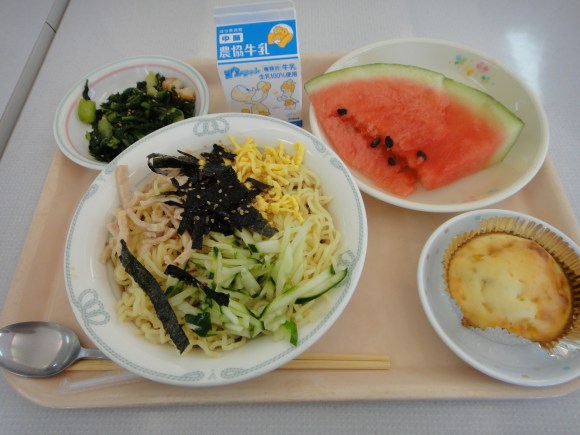
You, Me, And a Tanuki is a weekly featured blog run by Michelle, a Californian who is currently one of only two foreigners living in Chibu, a tiny fishing village on one of the Oki islands in Japan. Check back every Saturday for a new post or read more on her website here!
Ah, school lunch in Japan. I’ve had some of the best meals served to me on those plastic lunch trays. I’ve also had some of the worst. You might remember my post from last week that talked about the worst school lunch in the world. But for the most part, school lunch in Japan is surprisingly delicious and enjoyable.
School lunch, or kyuushoku as it’s called here, is one of the many examples of team work displayed in Japan. The students and teachers are split into groups and given a serving duty. For example, some students serve the soup, others the main dish, etc. They do this while wearing full aprons, hair nets, and masks. The students and teachers who are not on service duty form a line, grab a tray, and pick up one of each dish. Once everyone has been served and is seated at their desk (in Japan, the students eat in their classroom), everyone puts their hands together and says “itadakimasu” (I humbly accept this food). Only then can you dig in. I think this is a really nice custom as I recall my poor mother who was still in the process of trying to get all of the food on the table while her three daughters and husband were chowing down.
^Gyuu-don (beef bowl [healthy style]), soup, broccoli mayonnaise side dish, melon, and whole milk
^Summer vegetable curry and rice, Korean Squash gratin, daikon and seaweed side dish, mikan, and whole milk.
There are also some very interesting customs when it comes to food handling and preparation. One of our friends works at the school lunch center and says that she has to wash all fruits and vegetables three times. She also has three different aprons and must change them depending on the task (cutting vegetables, preparing food, cleaning dishes). Also, one of the staff must eat the school lunch at least half an hour before the students consume it to make sure that it’s safe to eat. Kyuushoku is probably the safest and most properly prepared meal you’re ever going to eat (a lot safer than when I cook and the 3 second rule is fully employed). It’s also really cheap for the amount and quality of food you get. I pay around 350 yen (~$4.50) for more food than I can comfortably eat that’s extremely fresh and healthy (no frozen food here, everything is made that day).
^Mabo Nasu (Chinese-style egg plant stir-fry), rice, dumpling soup, vegetable side, homemade mandarin orange jello, and whole milk.
Chibu’s kyuushoku is very special because we actually have three farmers who grow food on the island specifically for the school lunches. While we are eating, the elementary school students read an announcement about the school lunch and tell us which vegetables came from whose garden. A typical announcement might note that the carrots and cabbage in the soup are from X-san’s garden and then go on to tell us a few factoids about a vegetable and why it’s good for us. I think it’s really great that the school lunch center takes the time to acknowledge the farmers who grow the vegetables in our lunches.
^Chilled noodles, spinach and sesame seed side dish, watermelon, homemade kabocha steamed bread, and whole milk.
Despite the fresh and healthy meals that you are served at school, there are some drawbacks to having to eat kyuushoku every day. For one, you have to eat everything. When I first came to Chibu, I left literally around 10 grains of rice in my bowl and was promptly scolded by the elementary school student sitting next to me. The most extreme example of the enforcement of this rule is when one of the students, struggling to finish something he absolutely hated, was made to sit at the lunch table until he ate every bite. Two minutes later, the cleaning announcement came over the loud speaker and he missed his chance to play after lunch. As a teacher, I can get away with not eating everything, but I feel bad getting a free pass when the kids are forced to eat even their most hated of foods. This is why I force myself to eat my most hated meal: shishamo.
^Shishamo, chirashi zushi (deconstructed sushi), potato salad, soup, a mildly sweet mochi-like dessert, and whole milk
^Can you see why I struggle to eat these things from head to tail?
Oh also, they’re filled with tiny eggs. Yeah…
So there you have it, the wonders of kyuushoku. Even though I have to eat everything regardless of how it tastes to me, I love being served school lunch every day because there are a surprising variety of dishes ranging from Japanese, Chinese, Korean, and Western style. We receive a menu at the beginning of the month and I always read it, looking forward to my favorite lunches (and dreading having to eat shishamo which usually makes an appearance once every other month). I think the US should take a look into Japan’s cafeterias and try to improve the school lunches. I loved tater tots and pizza as a kid, but as Japan has shown me, there are tastier, healthier options to be found.
Michelle is originally from California, but currently living in the tiny fishing village of Chibu, one of the Oki islands in Japan. Being one of two foreigners living in an island village of a little over 600 people presents many adventures. Come back every Saturday for a new article featuring the interesting and bizarre things she comes across in her life in rural Japan. Once a week not enough? Check out her blog, You, Me, And A Tanuki, for photographs and even more articles.
We’re still looking for more unique and interesting stories from Asia to share with the world, so drop us a line if you’d like to have your own blog featured on RocketNews24.

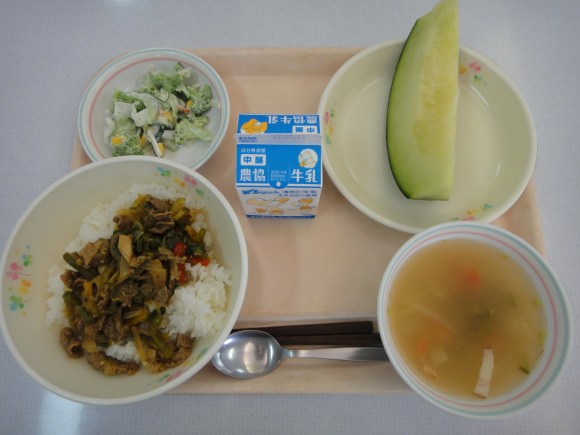
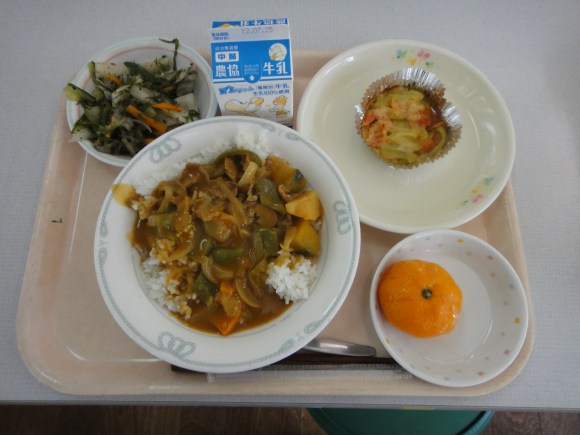
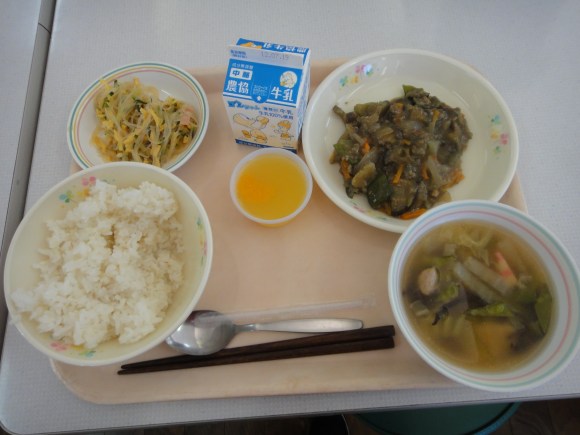
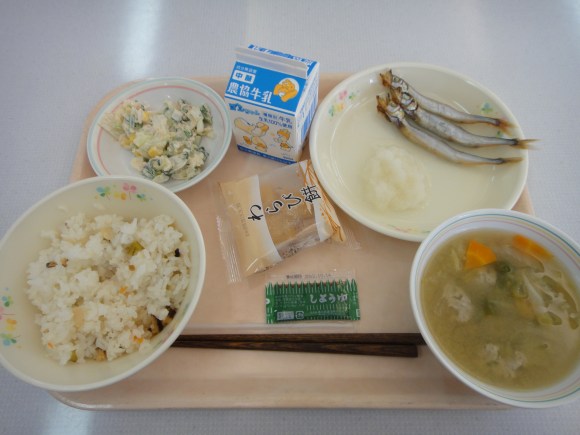
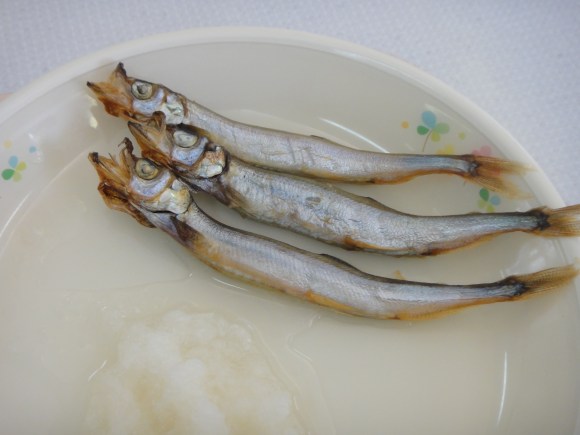
 Japanese School Lunch Fail【You, Me, And A Tanuki】
Japanese School Lunch Fail【You, Me, And A Tanuki】 Itadakimasu! A brief history of the evolution of Japanese school lunches
Itadakimasu! A brief history of the evolution of Japanese school lunches It’s Just Like a Handshake… 【You, Me, And A Tanuki】
It’s Just Like a Handshake… 【You, Me, And A Tanuki】 The Best Sushi We’ve Ever Eaten【You, Me, And A Tanuki】
The Best Sushi We’ve Ever Eaten【You, Me, And A Tanuki】 Our Japanese reporter’s encounter with American school lunch
Our Japanese reporter’s encounter with American school lunch Lawson adds doughnuts to its convenience store sweets range, but are they good enough to go viral?
Lawson adds doughnuts to its convenience store sweets range, but are they good enough to go viral? Viral Japanese cheesecake from Osaka has a lesser known rival called Aunt Wanda
Viral Japanese cheesecake from Osaka has a lesser known rival called Aunt Wanda The best Hobonichi diaries, covers and stationery for 2026
The best Hobonichi diaries, covers and stationery for 2026 Dazzling animation “Kaizo Trap” shows what being sucked into an expert game would look like【Video】
Dazzling animation “Kaizo Trap” shows what being sucked into an expert game would look like【Video】 Starbucks Japan adds new sakura Frappuccino and cherry blossom drinks to the menu
Starbucks Japan adds new sakura Frappuccino and cherry blossom drinks to the menu Five video games that will never, ever get made (but totally should)
Five video games that will never, ever get made (but totally should) Live-action Pokémon cooking videos melt the heart, whet the appetite【Videos】
Live-action Pokémon cooking videos melt the heart, whet the appetite【Videos】 Japan’s craziest burger chain takes menchi katsu to new extreme levels
Japan’s craziest burger chain takes menchi katsu to new extreme levels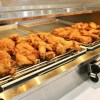 Is the all-you-can-eat KFC buffet in Tokyo really as good as they say it is?
Is the all-you-can-eat KFC buffet in Tokyo really as good as they say it is?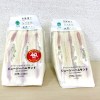 Japanese convenience store fools us with its 40-percent-more sandwich, but in a good way
Japanese convenience store fools us with its 40-percent-more sandwich, but in a good way Starbucks Japan releases first-ever Hinamatsuri Girls’ Day Frappuccino
Starbucks Japan releases first-ever Hinamatsuri Girls’ Day Frappuccino Japanese restaurant chain serves Dragon Ball donuts and Senzu Beans this spring
Japanese restaurant chain serves Dragon Ball donuts and Senzu Beans this spring Highest Starbucks in Japan set to open this spring in the Tokyo sky
Highest Starbucks in Japan set to open this spring in the Tokyo sky Japan Extreme Budget Travel! A trip from Tokyo to Izumo for just 30,000 yen [Part 1]
Japan Extreme Budget Travel! A trip from Tokyo to Izumo for just 30,000 yen [Part 1] Japan has only one airport named after a samurai, so let’s check out Kochi Ryoma【Photos】
Japan has only one airport named after a samurai, so let’s check out Kochi Ryoma【Photos】 Japan Extreme Budget Travel! A trip from Tokyo to Izumo for just 30,000 yen [Part 2]
Japan Extreme Budget Travel! A trip from Tokyo to Izumo for just 30,000 yen [Part 2] Japanese drugstore sells onigiri at pre-stupid era prices, but how do they compare to 7-Eleven?
Japanese drugstore sells onigiri at pre-stupid era prices, but how do they compare to 7-Eleven? Yakuzen ramen restaurant in Tokyo is very different to a yakuza ramen restaurant
Yakuzen ramen restaurant in Tokyo is very different to a yakuza ramen restaurant Tokyo Skytree turns pink for the cherry blossom season
Tokyo Skytree turns pink for the cherry blossom season Japan’s newest Shinkansen has no seats…or passengers [Video]
Japan’s newest Shinkansen has no seats…or passengers [Video] Starbucks Japan releases new sakura goods and drinkware for cherry blossom season 2026
Starbucks Japan releases new sakura goods and drinkware for cherry blossom season 2026 Foreigners accounting for over 80 percent of off-course skiers needing rescue in Japan’s Hokkaido
Foreigners accounting for over 80 percent of off-course skiers needing rescue in Japan’s Hokkaido Super-salty pizza sends six kids to the hospital in Japan, linguistics blamed
Super-salty pizza sends six kids to the hospital in Japan, linguistics blamed Starbucks Japan unveils new sakura Frappuccino for cherry blossom season 2026
Starbucks Japan unveils new sakura Frappuccino for cherry blossom season 2026 Foreign tourists in Japan will get free Shinkansen tickets to promote regional tourism
Foreign tourists in Japan will get free Shinkansen tickets to promote regional tourism The 10 most annoying things foreign tourists do on Japanese trains, according to locals
The 10 most annoying things foreign tourists do on Japanese trains, according to locals Take a trip to Japan’s Dododo Land, the most irritating place on Earth
Take a trip to Japan’s Dododo Land, the most irritating place on Earth Naruto and Converse team up for new line of shinobi sneakers[Photos]
Naruto and Converse team up for new line of shinobi sneakers[Photos] Is China’s don’t-go-to-Japan warning affecting the lines at a popular Tokyo gyukatsu restaurant?
Is China’s don’t-go-to-Japan warning affecting the lines at a popular Tokyo gyukatsu restaurant? Survey asks foreign tourists what bothered them in Japan, more than half gave same answer
Survey asks foreign tourists what bothered them in Japan, more than half gave same answer Japan’s human washing machines will go on sale to general public, demos to be held in Tokyo
Japan’s human washing machines will go on sale to general public, demos to be held in Tokyo Starbucks Japan releases new drinkware and goods for Valentine’s Day
Starbucks Japan releases new drinkware and goods for Valentine’s Day We deeply regret going into this tunnel on our walk in the mountains of Japan
We deeply regret going into this tunnel on our walk in the mountains of Japan Studio Ghibli releases Kodama forest spirits from Princess Mononoke to light up your home
Studio Ghibli releases Kodama forest spirits from Princess Mononoke to light up your home Major Japanese hotel chain says reservations via overseas booking sites may not be valid
Major Japanese hotel chain says reservations via overseas booking sites may not be valid Put sesame oil in your coffee? Japanese maker says it’s the best way to start your day【Taste test】
Put sesame oil in your coffee? Japanese maker says it’s the best way to start your day【Taste test】 No more using real katana for tourism activities, Japan’s National Police Agency says
No more using real katana for tourism activities, Japan’s National Police Agency says Whole Lotta Fish 【You, Me, And A Tanuki】
Whole Lotta Fish 【You, Me, And A Tanuki】 Stabbing Snails at the Bottom of the Sea 【You, Me, And A Tanuki】
Stabbing Snails at the Bottom of the Sea 【You, Me, And A Tanuki】 Privacy Please?【You, Me, And A Tanuki】
Privacy Please?【You, Me, And A Tanuki】 The Problem With Everyone Knowing Where We Live【You, Me, And A Tanuki】
The Problem With Everyone Knowing Where We Live【You, Me, And A Tanuki】 Organic Christmas Lights? No, it’s Persimmon Season in Japan 【You, Me, And A Tanuki】
Organic Christmas Lights? No, it’s Persimmon Season in Japan 【You, Me, And A Tanuki】 “A crazy man is coming to school today and he’s going to try to stab us”: Japan Takes Code Red Drills to the Extreme【You, Me, And A Tanuki】
“A crazy man is coming to school today and he’s going to try to stab us”: Japan Takes Code Red Drills to the Extreme【You, Me, And A Tanuki】 Six Crazy Things I Did Because I Was Cold 【You, Me, And A Tanuki】
Six Crazy Things I Did Because I Was Cold 【You, Me, And A Tanuki】 Japanese school lunch noodles fried so hard that children and teachers chip teeth, go to hospital
Japanese school lunch noodles fried so hard that children and teachers chip teeth, go to hospital Cooking Rice on a Campfire is Easier Than You Might Think【You, Me, And A Tanuki】
Cooking Rice on a Campfire is Easier Than You Might Think【You, Me, And A Tanuki】 Take Me Out to the Japanese Ball Game 【You, Me, And A Tanuki】
Take Me Out to the Japanese Ball Game 【You, Me, And A Tanuki】 “How I learned to stop worrying and eat Japanese school lunches,” by P.K. Sanjun
“How I learned to stop worrying and eat Japanese school lunches,” by P.K. Sanjun Eating Our Way Through Tokyo Disneyland and DisneySea【You, Me, And A Tanuki】
Eating Our Way Through Tokyo Disneyland and DisneySea【You, Me, And A Tanuki】 Coffee, coffee everywhere but not a drop to drink (that’s any decent)【You, Me, And A Tanuki】
Coffee, coffee everywhere but not a drop to drink (that’s any decent)【You, Me, And A Tanuki】 Tokyo government building serves local school lunch to public in Japanese cafeteria
Tokyo government building serves local school lunch to public in Japanese cafeteria Top 10 Japanese school lunch food items that adults miss the most
Top 10 Japanese school lunch food items that adults miss the most Convenience store fried chicken going into school lunches in Japan for Family Mart anniversary
Convenience store fried chicken going into school lunches in Japan for Family Mart anniversary